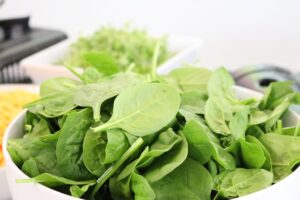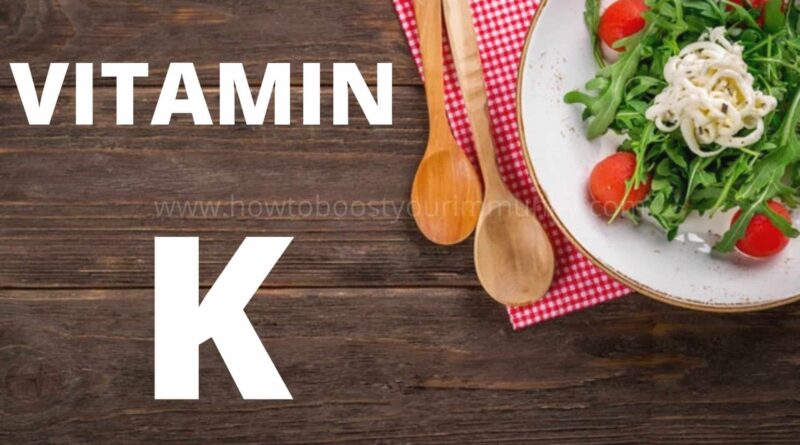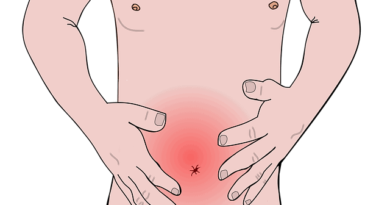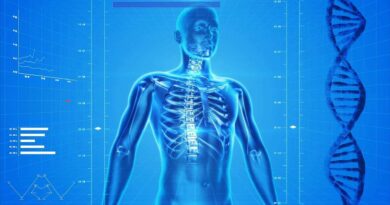Vitamin K Deficiency, Symptoms And Food Sources
Vitamin K deficiency is rare, it is often a neglected vitamin. The most important benefit of vitamin K is that it takes part in the production of coagulation factors. Recent studies have shown that vitamin K plays a role in building healthy bones and in the prevention and treatment of osteoporosis. In this article, we will learn more about Vitamin K deficiency, symptoms and food sources.
Vitamin K Deficiency, Symptoms And Food Sources
See also :
- 12 Ways To Manage Depression Without Medication
- 7 Habits That Drain Your Energy
- 8 Foods That Increase the Risks of Heart Attacks
- 7 Healthy Tips for Teenagers
- What is Granola? Is Granola Healthy?
- Red clover and its medicinal properties
- 7 Home Remedies To Relieve Constipation Naturally
- 5 Easy Ways to Control Overeating Desire
What is Vitamin K?
Vitamin K is a fat-soluble vitamin with two types, K1 and K2. Vitamin K1 can be taken into the body through food. Vitamin K2 is produced by bacteria in the gut. These two subtypes of vitamins work similarly, and their main function in the body is to ensure blood clotting. It is possible to get vitamin K, which is responsible for the production of proteins that enable blood to clot, from many foods.
Vitamin K Deficiency
Vitamin K deficiency occurs in cases such as gallbladder, kidney and liver diseases, the use of blood thinning drugs and antibiotics, and long-term unconscious diet. This is due to the body’s inability to absorb the vitamin. Therefore, its deficiency cannot be eliminated with food supplements and a physician must be consulted.
Vitamin K Deficiency Symptoms
Vitamin K helps blood clot and strengthens bones. Vitamin K deficiency is rare because it is found in commonly consumed green leafy vegetables.
When vitamin K is not met at an adequate level, vitamin K deficiency is seen in the person. This can lead to dangerous issues, as it prevents blood from clotting. If your blood does not stop at the slightest cut or wound, we can say that you have a vitamin K deficiency. Other signs are bleeding in the urinary tract and bruises that appear on the skin very easily. Excessive menstrual bleeding is also among the symptoms of vitamin K deficiency.
Bleeding in the navel seen in new-born babies is caused by vitamin K deficiency.
Vitamin K Sources
In case of vitamin K deficiency, vitamin K supplementation is prescribed by your doctor. Otherwise, you may experience very serious problems. A blood test will show that you have low levels of vitamin K in your blood. K1 injection is given to correct K1 deficiency in new-born babies.
Vitamin K that you cannot get from food can be obtained with tablets. If you have an irregular diet and you are not able to consume foods containing vitamin K, you can take tablets with the advice of your doctor. The amount you should take during the day is determined by your doctor according to your height and weight measurements.
What Foods Have Vitamin K?
Here is a list of foods containing vitamin K prepared for you to include in your nutrition program:
Broccoli:
It is a good source of vitamin K. You can consume it in a healthier way as boiled. You can get vitamin K in salads and soups, even in meals. 1 cup of broccoli contains almost 110 mg of vitamin K.

Spinach:
It is among the foods rich in vitamin K. You can easily use it in salads and meals. 1 cup of spinach contains approximately 144 mg of vitamin K. It will suffice for the day.
Okra:
it is a healthy source of vitamin K. 1 handful of okra will provide 34 mg of vitamin K.
Cabbage:
1 handful will give you 75 mg of vitamin K when consumed. You should consume plenty in its season.
Other sources :
Plums, prunes, avocados, figs, grapes, blackberries and blueberries are in the fruit group containing vitamin K.
Oils: Especially canola and soybean oil contain high levels of vitamin K. You can use it in your meals.
All green vegetables contain vitamin K. Lettuce, chard, parsley and green onions should not be missing from your plates.
Green tea is also among the beverages rich in vitamin K. You can meet your daily needs by drinking 1 cup of green tea a day.
Milk and dairy products are also effective foods in terms of vitamin K. You should not neglect to consume milk and dairy products during the day.
Vitamin K benefits? What does It Do?
Vitamin K plays an important role for your immune system and a healthy body.
Here are the vitamin K benefits and functions:
The most important function of vitamin K is blood clotting. Blood clotting is necessary in case of a cut or bleeding. Vitamin K is of vital importance in order to stop blood loss and prevent health problems.
Vitamin K is as effective as vitamin D in the development and formation of bones. If you take enough vitamin K for your body, you can prevent osteoporosis in older ages. At the same time, you will have a stronger and more vigorous skeletal system thanks to vitamin K.
Vitamin K is responsible for transporting calcium to the bones. For this reason, the calcium in your body is distributed evenly and you have a stronger immune system.
According to studies, vitamin K maintains sugar balance. Vitamin K intake should not be neglected in diseases such as diabetes.
Protects heart and brain health. It is recommended that you include foods containing vitamin K in your meals to prevent Alzheimer’s disease.
Vitamin K, which also protects your heart health, keeps your body strong from head to toe.
Vitamin K Damages: What happens in excess?
There is a measure of every nutrient your body will accept. When you go beyond this limit, your body will react and cause various discomforts. Unfortunately, vitamin K side effects will be seen when vitamin K is taken in excess. There is no harm in vitamin K taken through foods. However, when supplemental vitamin K is taken in excess, vomiting and weakness may occur first. Since it coagulates the blood more than it should, this will also be reflected in the liver.
For this reason, it will not be very healthy to go beyond the measure while feeding or taking support with vitamin K.
See also :
- 12 Ways To Manage Depression Without Medication
- 7 Habits That Drain Your Energy
- 8 Foods That Increase the Risks of Heart Attacks
- 7 Healthy Tips for Teenagers
- What is Granola? Is Granola Healthy?
- Red clover and its medicinal properties
- 7 Home Remedies To Relieve Constipation Naturally
- 5 Easy Ways to Control Overeating Desire





